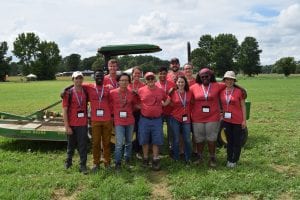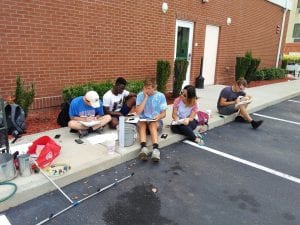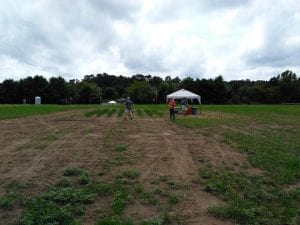Recently this summer, 11 other Cornell students and I traveled to Smithfield North Carolina to compete in the 2018 North Eastern Weed Science Society annual weeds competition. The contest was hosted by BASF Corporation who is the second largest producer and marketer of agricultural chemicals and related products in North America. It was very exciting to meet people involved in the industry as well as professors and students from other agricultural universities. There were just under 100 students from Guelph, Clemson, NC State, Penn State, The Ohio State University, Virginia Tech and Rutgers at both the undergrad and graduate levels.
The contest consisted of 4 main components, the first being Weed Identification. Of the 105 weeds we had to memorize, there were 25 in total to ID. There were both mature plants and juvenile weeds consisting of only cotyledons, as well as 5 different weed seeds. Next we moved on to Herbicide Identification which consisted of 10 plots that had been sprayed with 1 of 25 herbicides two weeks prior to the event. Using the symptomologies present, we had to identify the Herbicide as well as the family, WSSA group number, mode of action and site of action. This was the most challenging part of the competition, but in the end I managed to score decently well. Next we took a written examination on sprayer calibrations and conversion as well as performed a random practice calibration with a backpack sprayer as a team. Finally, we had two “farmer problems.” This was my favorite part of the competition. We were presented with a common problem and had to identify it as well as provide solutions for the present and future. We acted as the consultant in each situation, however it was a little stressful because some farmers were acting mad and the questions were very inquisitive. I enjoyed it so much because I thought it was a great representation of common problems faced in the industry, which I have never had the chance to experienced firsthand. BASF then provided us with a great dinner at a local winery where we got to talk with people of the industry and awards were given.
Overall the competition was very exciting and I gained a lot of knowledge I can now apply during my fieldwork at The Sustainable Cropping Systems Lab. For not having a weed science concentration or major like many of the other schools, Cornell placed very well! Our coaches Toni Ditimasso and Eugene Law helped out a lot in the learning process. I highly recommend that anyone staying in Ithaca next year checks out the team!



